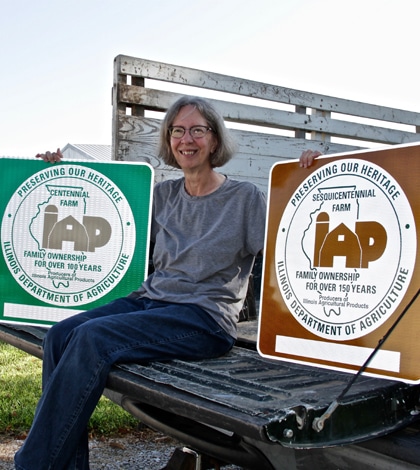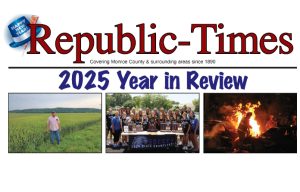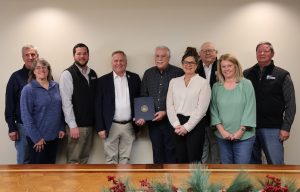Dannehold farms honored for longevity

Pictured, Sandra Dannehold showcases the signs she received for her farms being named Centennial and Sesquicentennial Farms in Illinois. (Kermit Constantine photo)
Illinois has recognized the history of a local farming family by designating their two farms Centennial and Sesquicentennial Farms.
The farms, which are located at 509 Country Club Lane in Waterloo, are owned by brother and sister Terry and Sandra Dannehold.
“I am privileged to present this distinction to the Dannehold family,” Illinois Director of Agriculture Raymond Poe said. “This designation not only honors their farm operation today, but also their ancestors who labored through adversity to maintain the family farm. The Centennial Farm program helps reinforce that family farming remains a viable entity in Illinois agriculture.”
To qualify for Centennial Farm status, an agricultural property must have been owned by the same family of lineal or collateral descendants for at least 100 years. For Sesquicentennial status, a family must own the property for at least 150 years.
A lineal descendant is a person in the direct line of descent, such as a child or a grandchild. A collateral descendant is not a direct descendant, but is otherwise closely related, such as a brother, sister, uncle, aunt, nephew, niece or cousin.
Sandra said the designations help reinforce the importance of family history.
“I think it is a really good program because sometimes farmers don’t look back on their own history,” Sandra said. “Farming is a very busy occupation, and sometimes it’s good to reflect on what got you here.”
The Danneholds’ farms joined the more than 9,800 Centennial Farms and 850 Sesquicentennial Farms across the state.
For being recognized by Illinois, the Danneholds received signs and certificates for each farm.
Sandra said she probably first heard about the Centennial Farms Program shortly after it began in 1972 by reading about it in farming magazines.
Sandra took note of it, having grown up on the Centennial Farm, which she calls “dad’s farm.”
“Farming is not just a way of making a living, it’s a lifestyle,” Sandra said. “Looking back on it, I think about how different farming was then. I’m still learning, since I’ve retired and moved here, how different farming is.”
Sandra went away to college in 1975, graduating with a law degree in 1982. She practiced law as an in-house banking attorney who specialized in commercial loans.
She moved back to the area in the fall of 2016 to take care of her father when he got sick and manage the farm.
She took over the farm and began living on it after he died at the age of 91.
“I just realized that it was going to be my responsibility and my pleasure to come here and take over the operation,” Sandra said.
Sandra does not farm the land herself, but rents it to George and Jim Gregson on a third basis. That means she gets one-third of the crops they harvest.
“We were very blessed to be able to acquire it, so it’s important that we honor that heritage,” she said. “Part of that is taking care of the ground, making sure it doesn’t erode and making sure that it’s well cared for and respected. Fortunately, I have farmers who do that. They care for the ground as if it was their own.”
Sandra, 60, who also has a master’s degree in history, began researching the farms’ history shortly after she started managing them.
She also remembered the Centennial Farm Program and learned about the Sesquicentennial Farm Program, which began in 2001.
She applied for the designations, paying the $50 application fee but saving money by verifying the title herself since she was an attorney.
Sandra said she applied to the program because how important she believes farming is.
“I think it’s important to recognize farmers and the tradition of farming, particularly in a county that has seen some development,” she explained. “It is good to remember the farmers are here and that farming is an economic decision, a social decision and a family decision. It’s good to respect and recognize what farmers do.”
Sandra’s Centennial Farm, “dad’s farm,” has been in her family since Feb. 22, 1879, when her great-great-grandfather Conrad Kolmer purchased it through a foreclosure sale.
The 140-acre farm cost Kolmer $2,230.
Sandra does not know why Kolmer bought the farm, as he invested in real estate across the area and sold parcels to local residents on credit.
The Sesquicentennial Farm, known as “mom’s farm,” has been in the family since Sandra’s great-great-grandfather John Stockel bought it on Aug. 23, 1848, from John and Eliza Morrison.
According to a property abstract done on the land, it was considered to be worth $600 in 1848.
Unlike Kolmer, Stockel most likely worked on the farm.
Both Kolmer and Stockel were German immigrants.
Over the years, the farms have grown a variety of crops including corn, wheat, oats, barley, alfalfa and red clover. They have also been home to animals like chickens, hogs and cows.
Currently, they are used to raise corn, soybeans and winter wheat.
Sandra and Terry will be the last of their family to farm the land, as neither are married or have children.
“Our plan is to keep it in farming as long as at least one of us is alive,” Sandra said. “Thereafter, I would hope that a farmer would want to step in and take over the reins.”






